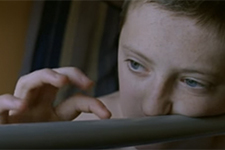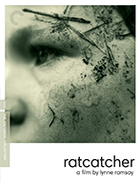Ratcatcher
|  Lynne Ramsay’s feature debut Ratcatcher won’t win any awards for originality of subject matter—after all, the pains of adolescence in the lower socioeconomic strata depicted in a social-realist manner is hardly new in British filmmaking—but it is done so deftly, with such a exquisitely poetic touch and keen understanding of the paradoxical coexistence of filth and beauty in the world, that you can forgive some of its narrative triteness. This is, in a word, a beautiful film. The story takes place in Glasgow, Scotland, during the fetid summer of 1973 in which garbage men staged a strike that lasted for months. Told in a loose, episodic manner that reminds one of the rambling ease of a summer day, it follows a few weeks in the life of a 12-year-old boy named James (William Eadie). Ramsay complicates James’s character in the opening minutes in a scene in which he is responsible for the accidental drowning of one of his friends. No one knows what happens except for James, and the guilt he feels for this incident is etched on his narrow, fragile countenance for the rest of the film. Even the most joyous moments are tinged with the memory of this initial event. James lives in a dilapidated housing project with his father (Tommy Flanagan), who tends to drink too much and become abusive; his mother (Mandy Matthews), who is tough but loving; and his two sisters (Michelle Stewart and Lynne Ramsay Jr.). His family holds together, but there is the constant sense that the ties that bind are threadbare and always in danger of breaking. Yet, it is here that Ramsay shows her true gifts, for she is able to find and convey the essential beauty of small moments that others might overlook—James’s parents dancing together slowly, the silly enjoyment of watching Tom Jones crooning “What's New Pussycat?” on TV, his mother combing his father’s hair and spraying it into place, all of which is underscored by the constant hope of moving someplace else, someplace better. Ratcatcher has some truly magical moments, almost all of which are banal reality transformed into fantasy through poetic filmmaking (Ramsay initially began as a still photographer, and it shows in her beautiful and unexpected compositions). At one point, James steals away on a public bus and finds himself in a new housing development still under construction. Ramsay’s camera conveys the mystical wonderment of something so simple as a bathtub still wrapped in plastic. She turns a nearby field into a small, earthbound embodiment of heaven as James jumps and rolls through the golden grasses on his own, exhilarated to be anywhere other than where his life normally takes place. The actor who portrays him, William Eadie, is a natural and unassuming child, slightly odd-looking with his oversized ears and deep-set eyes, yet convincing in his emotional range. A large part of the story concerns James’s growing relationship with a neighborhood girl, Margaret Anne (Leanne Mullen), who is a few years older than he is and, like James, often suffers at the hands of a pack of teenage boys who, at a loss for anything else to do, torment anyone younger or weaker than they. James and Margaret Anne form an odd bond, one that has less to do with conversation and revelation than with the simple sharing of space. When these two troubled kids are together, Ramsay focuses primarily on their physical proximity and touching, at one point giving us a funny little scene in which they take a bath together and scrub each other’s hair with lice soap. It is a scene that some might be tempted to read as erotic, but it is really more about tenderness and compassion, an understanding of each other that they feel, rather than discuss. The film was shot by Alwin Küchler and the production design was by Jane Morton, both of whom Ramsay met while a film student at the National Film and Television School and subsequently worked with on her award-winning short films (Küchler has gone on to a significant career, shooting films for Danny Boyle, Joe Wright, Michael Winterbottom, and John Madden). Together, they create a convincingly realistic, yet slightly surreal, portrait of life at a particular moment in history, with the festering black bags of garbage that litter the edges of the frame providing a telling visualization of social breakdown at its bleakest. Yet, while Ratcatcher is an intensely dirty movie—we are always aware of grit and mud and rot—the beauty of it is the way Ramsay manages to transcend the physicality of the environment and give us a hint of the characters’ souls and the hope deep within.
Copyright © 2021 James Kendrick Thoughts? E-mail James Kendrick All images copyright © The Criterion Collection | |||||||||||||||||||||||||||||
Overall Rating: 


 (3.5)
(3.5)


